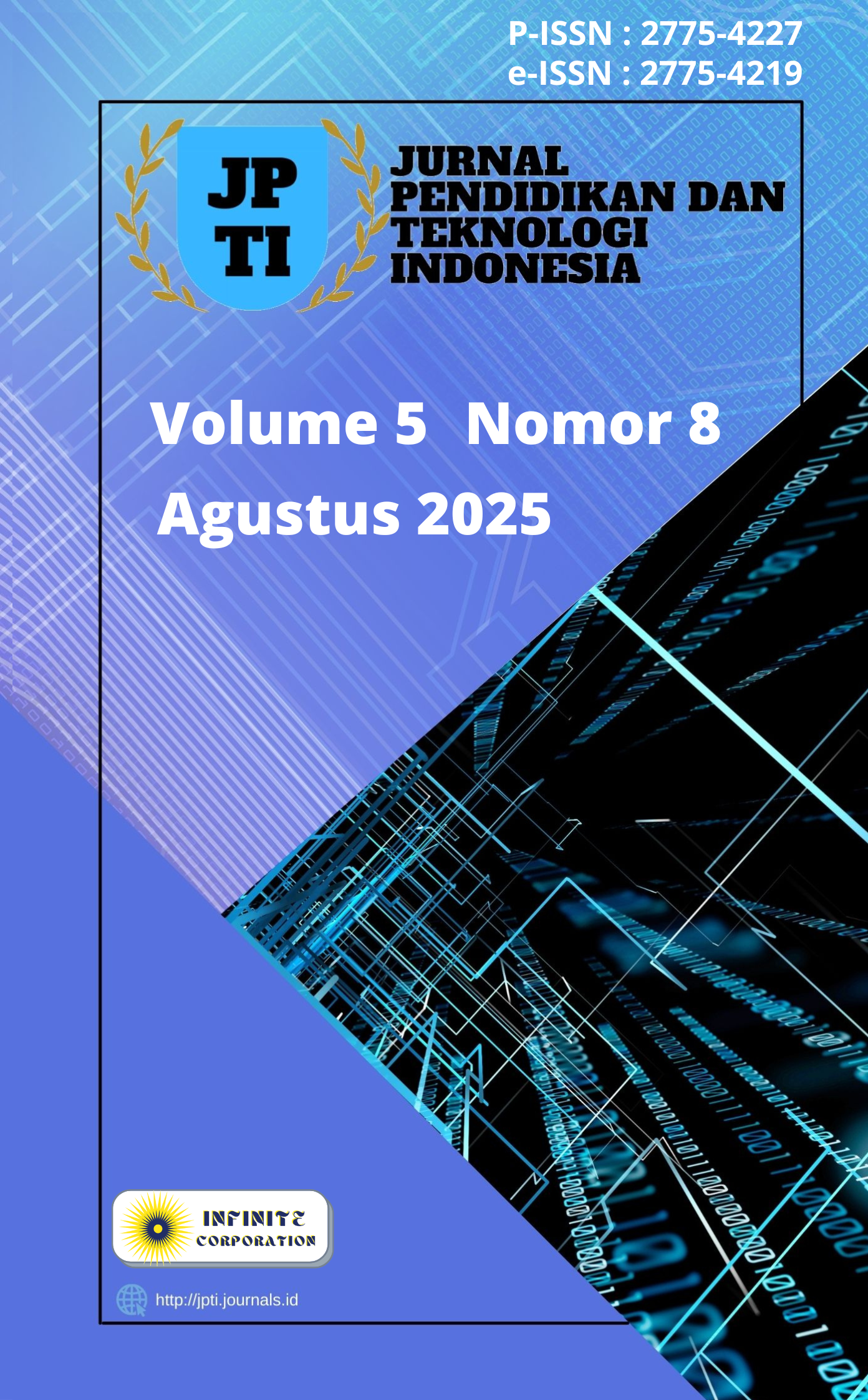Analisis Faktor-Faktor Penerimaan Teknologi dalam Pembelajaran Vokasi: Integrasi Model Technology Acceptance Model dan Theory of Planned Behavior di SMK Ma’arif 1 Kroya
DOI:
https://doi.org/10.52436/1.jpti.772Abstrak
Penerapan teknologi dalam pendidikan vokasi menjadi semakin penting untuk menunjang kesiapan siswa menghadapi era digital dan industri 4.0. Namun, tingkat penerimaan teknologi oleh siswa, khususnya di jurusan Teknik Komputer dan Jaringan (TKJ), masih menunjukkan variasi yang signifikan dan membutuhkan kajian lebih lanjut. Penelitian ini bertujuan untuk menganalisis faktor-faktor yang memengaruhi penerimaan teknologi dalam pembelajaran vokasi di SMK Ma’arif 1 Kroya, dengan mengintegrasikan pendekatan Technology Acceptance Model (TAM) dan Theory of Planned Behavior (TPB). Penelitian ini menggunakan metode kuantitatif dengan teknik analisis Partial Least Squares Structural Equation Modeling (PLS-SEM) melalui perangkat lunak SmartPLS 4. Hasil analisis menunjukkan bahwa PU dan PEU berpengaruh signifikan terhadap sikap siswa terhadap penggunaan teknologi (ATT), sedangkan SN dan PBC berkontribusi langsung terhadap niat penggunaan (BI). Selanjutnya, BI terbukti berpengaruh terhadap penggunaan aktual teknologi dalam pembelajaran (AU). Temuan ini mengindikasikan bahwa strategi peningkatan penerimaan teknologi perlu difokuskan pada penguatan persepsi kegunaan dan kemudahan teknologi, dukungan sosial, serta pemberdayaan kontrol perilaku siswa. Implikasi praktis dari penelitian ini mencakup pengembangan pelatihan teknologi bagi siswa dan guru, serta desain pembelajaran vokasi yang berbasis teknologi secara lebih interaktif dan aplikatif.
Unduhan
Referensi
V. Venkatesh and H. Bala, “Adoption and Impacts of Interorganizational Business Process Standards: Role of Partnering Synergy,” Inf. Syst. Res., vol. 23, no. 4, pp. 1131–1157, 2012, [Online]. Available: https://tamiu.idm.oclc.org/login?url=http://search.ebscohost.com/login.aspx?direct=true&db=aci&AN=84380600&scope=site
M. Al-Emran, V. Mezhuyev, and A. Kamaludin, “Towards a conceptual model for examining the impact of knowledge management factors on mobile learning acceptance,” Technol. Soc., vol. 61, no. February, p. 101247, 2020, doi: 10.1016/j.techsoc.2020.101247.
J. Mou and M. Benyoucef, “Consumer behavior in social commerce: Results from a meta-analysis,” Technol. Forecast. Soc. Change, vol. 167, no. July 2020, 2021, doi: 10.1016/j.techfore.2021.120734.
F. J. Miranda, A. Chamorro-Mera, and S. Rubio, “Academic entrepreneurship in Spanish universities: An analysis of the determinants of entrepreneurial intention,” Eur. Res. Manag. Bus. Econ., vol. 23, no. 2, pp. 113–122, 2017, doi: 10.1016/j.iedeen.2017.01.001.
V. Scuotto, O. Beatrice, C. Valentina, M. Nicotra, L. Di Gioia, and M. Farina Briamonte, “Uncovering the micro-foundations of knowledge sharing in open innovation partnerships: An intention-based perspective of technology transfer,” Technol. Forecast. Soc. Change, vol. 152, no. December 2019, p. 119906, 2020, doi: 10.1016/j.techfore.2019.119906.
Q. Yang, C. Pang, L. Liu, D. C. Yen, and J. Michael Tarn, “Exploring consumer perceived risk and trust for online payments: An empirical study in China’s younger generation,” Comput. Human Behav., vol. 50, pp. 9–24, 2015, doi: 10.1016/j.chb.2015.03.058.
C. Liao, J.-L. Chen, and D. C. Yen, “Theory of planning behavior (TPB) and customer satisfaction in the continued use of e-service: An integrated model,” Comput. Human Behav., vol. 23, no. 6, pp. 2804–2822, 2007.
A. Astari, N. Yasa, I. Sukaatmadja, and I. Giantari, “Integration of technology acceptance model (TAM) and theory of planned behavior (TPB): An e-wallet behavior with fear of COVID-19 as a moderator variable,” Int. J. Data Netw. Sci., vol. 6, no. 4, pp. 1427–1436, 2022.
C. Liao, J. L. Chen, and D. C. Yen, “Theory of planning behavior (TPB) and customer satisfaction in the continued use of e-service: An integrated model,” Comput. Human Behav., vol. 23, no. 6, pp. 2804–2822, 2007, doi: 10.1016/j.chb.2006.05.006.
H. C. Yang, “Bon appétit for apps: Young American consumers’ acceptance of mobile applications,” J. Comput. Inf. Syst., vol. 53, no. 3, pp. 85–96, 2013, doi: 10.1080/08874417.2013.11645635.
S. D. Lestari, F. M. Leon, S. Widyastuti, N. A. Brabo, and A. H. P. K. Putra, “Antecedents and consequences of innovation and business strategy on performance and competitive advantage of SMEs,” J. Asian Financ. Econ. Bus., vol. 7, no. 6, pp. 365–378, 2020, doi: 10.13106/JAFEB.2020.VOL7.NO6.365.
N. Q. Huy, L. P. Nga, and P. T. Tam, “Applied Simulation Modeling for Promoting Policy Recommendations for Microfinance Activity Development?: a Case Study in Vietnam,” vol. 4, no. 4, pp. 333–345, 2023.
A. S. Mustafa and M. B. Garcia, “Theories integrated with technology acceptance model (TAM) in online learning acceptance and continuance intention: A systematic review,” in 2021 1st Conference on online teaching for mobile education (OT4ME), IEEE, 2021, pp. 68–72.
M. Almulla, “Technology Acceptance Model (Tam) and Elearning System Use for Education Sustainability,” Acad. Strateg. Manag. J., vol. 20, no. 4, pp. 1–13, 2021.
E. Junnonyang, “Integrating TAM, perceived risk, trust, relative advantage, government support, social influence and user satisfaction as predictors of mobile government adoption behavior in Thailand,” Int. J. Ebus. eGovernment Stud., vol. 13, no. 1, pp. 159–178, 2021.
C. Tam, A. Loureiro, and T. Oliveira, “The individual performance outcome behind e-commerce,” Internet Res., vol. 30, no. 2, pp. 439–462, Jan. 2020, doi: 10.1108/INTR-06-2018-0262.
R. S. Wafiyyah and N. M. W. Kusumadewi, “The Effect of Perceived Usefulness, Perceived Ease Of Use, And Trust On Repurchase Intention On E-Commerce Shopee,” IJISET-International J. Innov. Sci. Eng. Technol., vol. 8, no. 7, pp. 428–434, 2021, [Online]. Available: www.ijiset.com
D. Kala, D. S. Chaubey, R. K. Meet, and A. S. Al-Adwan, “Impact of user satisfaction with e-government services on continuance use intention and citizen trust using TAM-ISSM framework,” Interdiscip. J. Information, Knowledge, Manag., vol. 19, p. 1, 2024.
C. Ma and M. Y. Cheok, “The impact of financing role and organizational culture in small and medium enterprises: Developing business strategies for economic recovery,” Econ. Anal. Policy, vol. 75, pp. 26–38, 2022, doi: 10.1016/j.eap.2022.04.009.
M. Tajvidi, M. O. Richard, Y. C. Wang, and N. Hajli, “Brand co-creation through social commerce information sharing: The role of social media,” J. Bus. Res., vol. 121, no. June, pp. 476–486, 2020, doi: 10.1016/j.jbusres.2018.06.008.
M. Tajvidi, M.-O. Richard, Y. Wang, and N. Hajli, “Brand Co-creation Through Social Commerce Information Sharing: The Role of Social Media,” J. Bus. Res., vol. 121, pp. 476–486, 2020, doi: https://doi.org/10.1016/j.jbusres.2018.06.008.





















